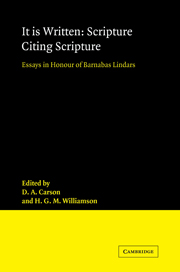5 - Wisdom
Published online by Cambridge University Press: 16 January 2010
Summary
The acceptance of the emergent canonical tradition of the Old Testament among the teachers of wisdom in the immediate pre-christian period was to pose one of the most decisive features of the intellectual encounter between Judaism and Hellenism. How and why this should have been the case rests in part on the distinctive characteristic elements of wisdom itself, as this originated outside Israel in the ancient Near East, and in part on the specifically literary form of the OT. Since literacy was to prove one of the most desirable intellectual attainments which the wise came to foster and promote, and the emergent biblical tradition was essentially a literature, the need for the relationship between wisdom and the biblical tradition to be made clear came to be of paramount importance.
We may begin this examination of the earliest manifestations of an interest among the wise in the interpretation and character of Israel's traditions about the world and its own national destiny by looking at the character of wisdom itself. All attempts to define the nature of wisdom, either in terms of a circumscribed set of intellectual presuppositions (cf. Scott, 1971), or by reference to its probable functional and professional utility (cf. McKane, 1965), may be set aside as only partial descriptions of its character. Clearly wisdom did have certain intellectual presuppositions, being both pragmatic and empirical, and it also possessed certain functional and professional affiliations, being closely associated with the spheres of both governmental administration and the wider needs of the education of the young. However neither feature can be adduced as providing an exclusive and comprehensive explanation for the origin and pursuit of wisdom in Israel.
- Type
- Chapter
- Information
- It Is Written: Scripture Citing ScriptureEssays in Honour of Barnabas Lindars, SSF, pp. 67 - 84Publisher: Cambridge University PressPrint publication year: 1988

